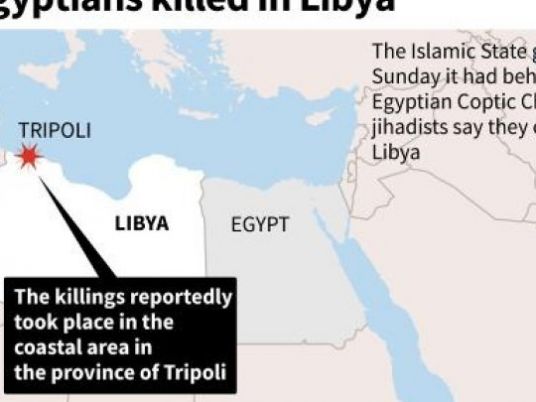
As fears grow that the Islamic State group is building a new stronghold in violence-wracked Libya, analysts warn that international military intervention would risk plunging the country deeper into turmoil.
Libya's eastern neighbour Egypt has called for concerted international efforts to tackle IS in the North African state.
Here are some key questions and answers about possible action:
Who would be targeted?
The expansion of IS is seen by the international community as the biggest threat in Libya, where rival militias and two parallel governments are vying for control of territory and oil wealth.
The fear is that IS is establishing a new bastion that could be used as a springboard for attacks on Europe which lies just across the Mediterranean.
But experts say it would be hard to identify targets for air strikes given the multitude of militias and jihadist factions.
IS is believed to have a toehold in the town of Derna in the east of the largely lawless country, and there are signs its presence is widening elsewhere.
Jihadist groups are trying to establish themselves in areas held by Fajr Libya (Libya Dawn), an Islamist-backed militia alliance that controls swathes of western Libya including the capital Tripoli.
Fajr Libya staunchly opposes international intervention and condemned recent Egyptian air strikes in retaliation for the beheading of 21 Coptic Christians.
The alliance is battling forces led by General Khalifa Haftar, who is backed by the internationally recognised government based in Libya's far east.
Egypt has called for the lifting of an arms embargo that Libya's Western-backed government says has hindered its efforts to tackle Islamist-linked groups.
Haftar's forces are also fighting militias in the second city of Benghazi led by Ansar al-Sharia, blacklisted by the United Nations for its links to Al-Qaeda.
International intervention would "support Haftar's strategy at the expense of Fajr Libya", says Luis Martinez, a specialist in North Africa and the Middle East and senior research fellow at CERI in Paris.
Italy has warned IS fighters could forge an alliance with militias.
In the event of air strikes the jihadists could blend into the population as they have done in Syria and Iraq where IS has proclaimed an Islamic "caliphate" in areas under its control.
A ground intervention, meanwhile, would require tens of thousands of troops and "have little chance of success," said security expert Mazen Cherif. "The Afghan case is the perfect example."
What are the risks?
"Intervention will turn Libya into a land of jihad where militants will gather, not only from the Maghreb and Africa but also from Syria and Iraq," warns Cherif.
Martinez said aerial bombardment would "radicalise the population" because of "the collateral damage and civilian casualties such an operation would generate".
"Countries that decide to intervene often have no serious policies for the post-military phase, as was the case in 2011" when NATO-backed rebels toppled and killed longtime dictator Moamer Kadhafi, he added.
"The bombardment of Kadhafi was competent; what was incompetent was helping Libyans in the resulting transition," he adds.
Libyan analyst Ahmed Mohamed Nouh says the international community bears a responsibility towards Libya given the turmoil that followed Kadhafi's overthrow.
"The West betrayed us in 2011. It abandoned us. Now it senses danger — this is the time it must rush to do what it can," he says.
What's the alternative?
"The solution is political, not military," Martinez says. "It will no doubt take time, but this is the only way the country will eventually become a state with a representative government."
Cherif agrees.
"As a first stage, there must be a political solution that allows the rival factions to unite and build a national Libyan army," he says.
"Later the West can support the Libyan forces in facing up to the Islamic State group."
Bernardino Leon, the UN mission chief in Libya, has been trying for months to broker a political deal that would allow the formation of a government of national unity, but so far without success.
